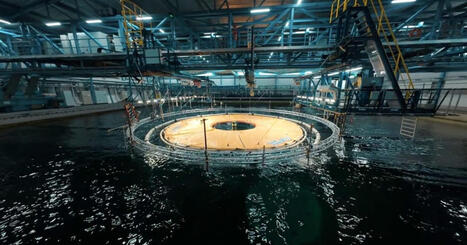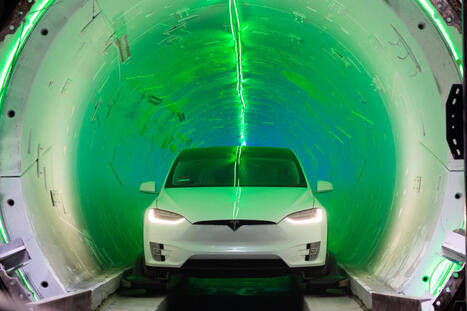 Your new post is loading...
 Your new post is loading...
Super-cheap EVs exist in other parts of the world, as advances in battery tech and manufacturing are making new cars significantly cheaper. But the US market presents unique challenges for automakers.
Skyven Technologies is making clean steam in a cost-effective way. The tech could boost efforts to decarbonize heavy industry.
It is the first time states have formally committed to information integrity and fighting back against climate disinformation.
Even without climate change, the Outer Banks—a nearly two-hundred-mile stretch of barrier islands between the mainland and the Atlantic, running from just north of Roanoke Island, where the British first settled in 1585, down the North Carolina coast—are precarious. The islands want to move, as waves and wind push sand from the ocean edge to the leeward or sound side. You could see the whole process explained on this National Park Service sign if it weren’t half covered with sand by the very processes it describes.
Across Africa’s urban neighbourhoods, a quiet revolution is unfolding. Millions of families are going online for the first time not in office parks or gated suburbs, but in dense, vibrant communities where affordability, trust, and daily realities shape every decision.
With demand rising and tax credits expiring, the utility wants to rapidly expand the batteries and solar it’s building near the shuttering Sherco coal plant. Xcel Energy’s sprawling Sherco Energy Hub will be among the United States’ biggest solar farms when the last of its three approved phases powers up next year. Soon after, the central Minnesota site could also host one of the Midwest’s biggest battery clusters. In a Halloween filing, Xcel asked the Minnesota Public Utilities Commission for permission to double its planned battery capacity at Sherco while adding a 200-megawatt fourth phase of solar there and deploying about 136 MW of batteries at a separate site southwest of Minneapolis.
Europe is hurtling toward digital vassalage. Under Ursula von der Leyen, the European Commission president, EU laws to tackle tech giants have been either not applied or delayed, for fear of offending Donald Trump. Now leaked documents reveal that the European Commission plans to gut a central part of Europe’s digital rulebook. This will hurt Europe’s innovators and hand the future of Europe’s tech sovereignty to US firms. Once Europe’s most hyped law, the General Data Protection Regulation (GDPR) is now on the chopping block. Powerful forces within the European Commission, supported by the German government, hope that deregulation will boost Europe’s tech sector, particularly AI. This is a grave mistake. China’s DeepSeek, which has stunned the AI world over the past year, emerged under a legal regime far stricter than Europe’s. China’s rigorous pre-deployment rules appear to have done its world-beating AI innovation no harm. Europe’s problem is not that it has too many rules for AI, but that it hypes those rules and then neglects to enforce them. This is why Google, Meta, Microsoft et al dominate Europe’s market.
The AI Boom: A Double-Edged Sword Artificial Intelligence has been marketed as our shiny new superhero. It writes essays in seconds, spots cancer cells better than doctors, and even predicts weather disasters before they happen. It’s dazzling, almost magical. But here’s the uncomfortable truth: every time we marvel at AI’s genius, somewhere in the background, a server farm hums, a smokestack churns, and a river runs a little drier. The AI revolution isn’t just code and algorithms — it’s concrete, steel, electricity, and water. And like any great invention, it comes with a bill. One we’ve barely started to read.
Data centers strain energy, raising questions of fairness, sustainability, and survival in a continent already struggling with scarcity, writes William Burns.
Sizable Energy raised $8M to build a demonstration plant that stores energy for long durations by pumping brine between inflatable reservoirs in the sea.
At COP30, a key UN leader warns that as "disasters decimate the lives of millions" and "when we already have the solutions," inaction on the climate crisis "will never, ever be forgiven."
The United States has in recent years become a stronghold for climate change skepticism, especially since the country’s declaration in 2001 that it would not participate in the Kyoto Protocol. Nevertheless, though it is a well-documented fact, it might surprise you to learn that, a far cry from the United States’ recent ambivalence with respect to the modern scientific theory of man-made climate change, the country’s founders were keen observers of climatic trends and might even be counted among the first climate change advocates. From the start, the project to colonize North America had proceeded on the understanding that climate followed latitude; so dependent was climate on the angle of the sun to the earth’s surface, it was believed, that the word ‘climate’ was defined in terms of parallels of latitude. New England was expected to be as mild as England, and Virginia as hot as Italy and Spain. Surprised by harsh conditions in the New World, however, a great number of the early settlers did not outlast their first winter in the colonies. Many of the survivors returned to Europe, and in fact, the majority of 17th-century colonies in North America were abandoned.
COP30, which is also known as the 2025 United Nations Climate Change Conference, is underway—and Trump won’t be attending. He’ll be glad he decided to skip it too, as several world leaders at the event are throwing shade his way. Without saying Trump’s name, Brazil’s President Lula da Silva called out the “extremist forces that fabricate fake news and are condemning future generations to life on a planet altered forever by global warming.” While French President Emmanuel Macron stated: “climate misinformation today poses a threat to our democracies.” Others were more direct, like Colombian President Gustavo Petro, who said: “Trump is against humankind.” And Chilean President Gabriel Boric blasted Trump for calling climate science a “hoax” and “con job,” stating: “That is a lie … We might have legitimate discussions about how to face these things, but we cannot deny them.”
|
As consumers flock to “reef-safe” and “ocean-friendly” skincare, beauty brands are selling a vision of ocean purity that is more marketing-driven than science-based. The personal care industry has mastered the art of marketing eco-consciousness— evolving beyond familiar labels like “green,” “clean,” and “natural”—into a new wave of sea-inspired branding that claims to champion ocean conservation. Terms such as “reef-safe” and “ocean-friendly” evoke images of crystalline waters and thriving coral reefs, yet behind the glossy marketing lies a regulatory murk. With no federal standards or clear definitions, consumers are left to navigate a tide of misleading labels.
The firefighters had to be treated at a hospital and received permanent scars, according to a report from Fortune. But The Boring Company was not fined after it met with state officials.
As industrial operations move to Texas, residents find that their drinking water has been promised to companies. In 2019, Corpus Christi, Texas’s eighth-largest city, moved forward with plans to build a desalination plant. The facility, which was expected to be completed by 2023, at a cost of a hundred and forty million dollars, would convert seawater into freshwater to be used by the area’s many refineries and chemical plants. The former mayor called it “a pretty significant day in the life of our city.” In anticipation of the plant’s opening, the city committed to provide tens of millions of gallons of water per day to new industrial operations, including a plastics plant co-owned by ExxonMobil and the Saudi Basic Industries Corporation, a lithium refinery for Tesla batteries, and a “specialty chemicals” plant operated by Chemours. The facilities went into operation, but the desalination plant stalled out in the planning process, and its projected costs ballooned to more than a billion dollars. In the meantime, the city suffered through a multiyear drought, and local reservoirs reached alarmingly low levels. Residents were prohibited from watering their lawns or hosing down their cars; industrial operations, largely exempt from drought restrictions, kept drawing the water they had been promised.
A German court ruled that OpenAI’s ChatGPT violated the nation’s copyright laws by training its language models on licensed musical work without permission.
UK altnets are buoyant, Proactive International PR's CEO says, despite predictions from some that a consolidation doomsday would arrive.
Massachusetts lawmakers may double the number of cities and towns allowed to ban fossil fuels in new construction. A bill under consideration would add up to 10 communities to an ongoing pilot program that proponents say is already reducing emissions, making homes healthier, and lowering energy bills — all without stifling the development of new housing. Cities including Salem and Somerville are lining up to participate in an expanded program, and some local leaders in Worcester are eager to take part, too. Boston, the state’s largest city, has previously expressed interest in joining. “We’re a coastal community that’s going to bear the brunt of climate change,” said state Rep. Manny Cruz, a Democrat representing Salem. “We want to make sure we’re doing our part to mitigate the damage.”
In the heart of Silicon Valley, two freshly built data centers designed for the world’s most power-hungry computing workloads are standing empty.
In many African cities, millions of people still access the internet the same way previous generations collected water through daily trips, small containers, and constant rationing. However, today’s buckets don’t just run out fast; they leak.
Export controls highlight China’s influence in tech supply chains at a moment when the EU is ramping up AI ambitions, reports Raluca Besliu.
Christine Galvagna proposes an EU fund to support decentralized, public service focused social media networks to protect digital rights and democracy.
The Charles River is a "Class B" river, meaning that it's suitable for boating and swimming, writes Frederick Hewett. But now authorities want to downgrade it so they don’t have to solve our sewage problem.
Many economists and business leaders are raising alarms about falling birthrates. But advocates for lower human populations say a less crowded world will be happier and more sustainable.
|






 Your new post is loading...
Your new post is loading...





























This is just tragic because people had no idea it was going to get so bad. Some where vacationers from Canada just trying to enjoy the sun during the holidays but it ended up a nightmare and ruined the local water supply. Next time you have to hope they will be better prepared and will have a better way of being warned before something like this will kill other people.